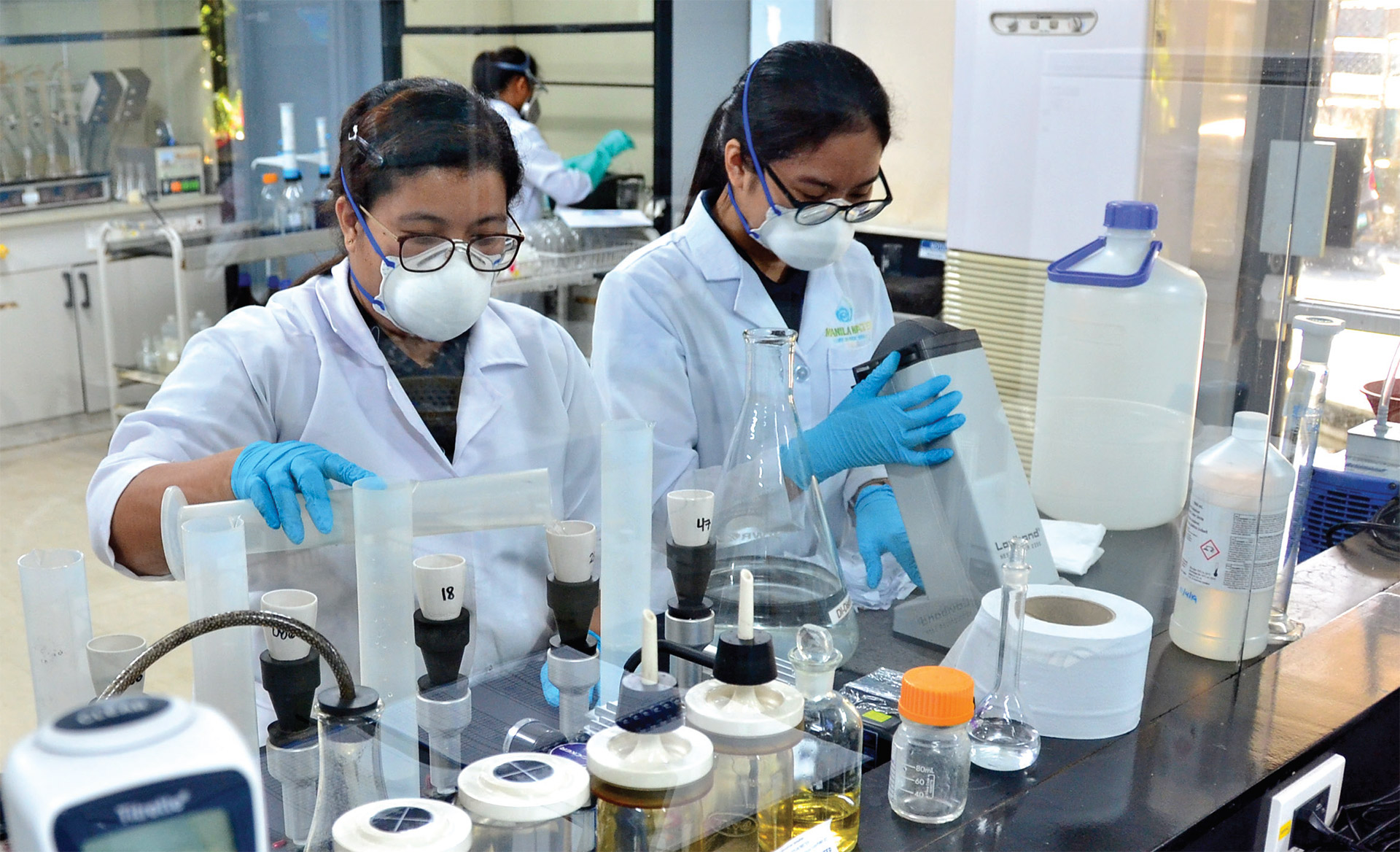Sustainability at Manila Water

Access to water and sanitation is a universally acknowledged fundamental human right, and consequently is a basic lifeline in any community that ensures healthy and productive inhabitants and a thriving economy. For Manila Water, it is a call for shared value creation – the provision of innovative solutions to social and environmental issues, at scale – that the company has aligned its vision and mission with, best articulated in the United Nation’s Sustainable Development Goal 6 that seeks to increase the proportion of the population that has no access to clean water and sanitation.
Manila Water has a core service obligation to provide water and wastewater services delivered to customers in a reliable and efficient manner, resilient towards various risk scenarios, and at an affordable cost. The company continuously strives to expand these services to more people -- especially the marginalized -- and improve the way its services are delivered.
SERVICE ACCESS FOR ALL
Manila Water believes that inclusivity is fundamental in its service expansion plans, making sure that no one gets left behind, espcially the marginalized communities, also known as the base of the pyramid. The “Tubig Para Sa Barangay” (TPSB) program addresses the needs of low-income communities of having clean and affordable water. Together with the innovations adopted in managing non-revenue water, the TPSB has become one of Manila Water’s initiatives that have been recognized as best practices by the global water sector.
Complementing the TPSB program is the Lingap program which provides clean water to public service institutions such as schools, public markets, and hospitals, making sure that families have clean and safe water beyond their dwellings. Both TPSB and Lingap have been replicated and adapted to local conditions in Boracay and Laguna, in partnership with the Manila Water Foundation.
LEVERAGING ON PARTNERSHIPS IN SERVICE DELIVERY
Working closely with community leaders and local governments is essential in achieving the objective of providing water and sanitation to more communities especially in times of crises. Partnerships formed through the years were strengthened in the water crisis that hit the Manila Concession in March 2019. Local governments and national government agencies played a significant role during tough times, magnifying the calls of their constituents and collaborating with Manila Water’s business area offices in identifying and arranging assistance schedules for specific areas, in some cases augmenting the equipment of Manila Water by deploying their own water trucks, and ensuring that Manila Water employees had adequate security.
Customer centricity has always been part of Manila Water’s business values. Since the early years of the company, its unique proactive territory management approach anchored on ‘knowing the customer,’ led to success in attaining business goals, and this approach is continuously being updated through adjustments in organizational structure and business processes in accordance with changes in customer preferences.
POPULATION SERVED

Manila Concession
Boracay Water
Bulacan Water
Calasiao Water
Cebu Water
Clark Water
Estate Water
Laguna Water
Obando Water
Unique Manila Water partnership mechanism with stakeholders is the customer kasangga system. Community partners, or kasanggas as Manila Water calls them, are customers who act as the company’s force multipliers on the ground by relaying advisories to customers on matters such as water interruption, desludging drives and public consultations. Kasanggas also provide real time feedback to the company such as water pilferages, pipe breakages and other service complaints, resulting in faster response times and problems resolution.
BUILDING RESILIENT COMMUNITIES
The impact of climate change on water supply coupled with the needs of a growing population and economy is a concern that Manila Water has always considered in managing top risks and opportunities. In the course of the expansion of water services in the past two decades, the company has strived to avoid both physical (nature-derived) and economic (man-made) water scarcity through water source protection and new water source development initiatives.
The water supply crisis which had its onset in March 2019 was a result of natural and man-made water scarcity. The mild El Niño of 2018-2019 produced very little rainfall to replenish reservoirs, but the failure to invest in new water sources infrastructure was a more fundamental root cause that was years in the making. Continuous dialogue and collaborative efforts with MWSS, the water security agency, and other government institutions are being undertaken to restore the reliable supply of water in Metro Manila.
Manila Water was the first Philippine company to adopt a Climate Change Policy in 2007, consequently revised in 2013 in response to the National Framework Strategy for Climate Change in 2010, anchoring on adaptation as a key strategy. While incremental benefits at a global scale can be derived from the reduction of carbon footprint from operations, the reality for Manila Water is that it is highly dependent on the hydrologic cycle which is among the fundamental physical processes heavily affected by climate change, and thus it needs to adapt to the new reality and strive to keep its people, physical assets and operational processes resilient to calamities, thus ensuring that the vulnerable communities it serves continue to enjoy reliable services and avoid societal and economic disruption.

COMMITMENT TO WATER QUALITY AND HEALTH
Manila Water responsibility does not end in simply providing reliable (24/7) water supply. The company leaves no room for compromise on water quality. In 2019, the Manila Concession collected 77,834 water samples of raw and treated water at the facilities and drinking water from customers’ taps. In a similar manner, the other Philippine subsidiaries collected 2,686 water samples.
All samples are tested in world-class laboratories accredited by the Department of Health, recognized by the Philippine Department of Environment and Natural Resources, and certified against ISO 9001:2015 for selected facilities (Quality Management), ISO 14001:2015 (Environmental Management), OHSAS 18000:2007 (Occupational Health and Safety). The Manila concession’s laboratory is certified against ISO IEC 17025:2017 (competence testing and calibration laboratories).
The company ensures that water quality risks are continuously addressed across the water value chain, minimizing the contamination of raw water at the source, ensuring treatment complies with allowable limits, and providing protection at reservoir storage and during distribution. All potential risks are assessed, and appropriate control measures are incorporated in all parts of operations, control measures are identified and implemented, and policies and procedures are always upgraded as part of continuing improvement.
The Manila Concession’s revised and expanded Water Safety Plan (WSP) has been approved by the Department of Health in November 2019. The Water Safety Plan is a comprehensive document that identifies existing and emerging contamination risks along the water trail, from the sources and treatment facilities all the way to customers’ taps, with detailed control measures for each aspect of operations and a process for validating effectiveness and continuous improvement. The other Philippine subsidiaries are in various stages of WSP preparation, review and regulator approval, in accordance with the Department of Health directive to develop and implement plans to ensure delivery of safe drinking water.